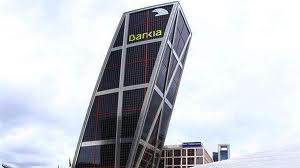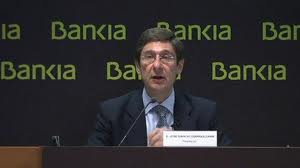1. Unemployment in Spain is on the rise as an astounding 25% of the nation is left without any form of employment.
2. The construction boom that lasted from 1995 to 2007 saw property developers take out large loans for their construction projects only to find themselves dragged into a worldwide recession soon after that saw property prices plummet. Many buyers that had put down deposits on property failed to complete as uncertainty set in after a global panic arose leaving hundreds, if not thousands of unfinished or unsold developments are scattered all over the nation. The result? Developers were unable to meet their loan repayments and banks were obligated to repossess all this real estate, unable to recoup their investments. An additional and still unresolved issue is the extent of the debt created by home owners who are also unable to meet their mortgage repayments.

Bankia Headquarters in Madrid
3. The unfortunate bank under the microscope is BANKIA, S.A., the result of a merger between 7 savings banks or “cajas” in 2010 (La Caja de Canarias, Caja Madrid, Bancaja, Caja de Ávida, Caixa Laietana, Caja Segovia and Caja Rioja). This new entity moved on to become Spain’s fourth largest bank with more than 12 million customers. In 2012, less than two years after its formation, it was the 3rd largest lender in Spain but top of the list as holders of real estate assets in the region of 38 billion euros.
Everything begun to unravel when on 7th May 2012, Rodrigo Rato unexpectedly stepped down as chairman to pave the way for a government rescue plan for the bank. José Ignacio Goirigolzarri, a well known Spanish economist took over to try to resolve the flagging bank’s financial issues. His efforts have led to a request for a 19 billion euro bailout following an earlier 4.46 billion euro bailout in 2008 to loan parent company BFA that has a 45% indirect stake in Bankia. This move has now been termed as what could be the largest bailout in history at a staggering 23.5 billion euros, much more than initial calculations.

In the hot seat. Bankia’s newly appointed chairman, Jose I. Goirigolzarri explains his actions at a press conference held at the end of May
Curiously, this isn’t even the main point of concern. Spain’s government Fund for Orderly Bank Restructuring, FROB (Fondo de Reestructuración Ordenada Bancaria) in place precisely for such contingencies does not have sufficient funds to cover the bailout, falling short by approximately 14.6 billion euros.
To compensate and to avoid FROB from borrowing more funds on the international market, the Spanish government has decided to bail Bankia out with the 19 billion euros requested in government bonds that Bankia will be able to use as capital assets as part of the nationalization process. Instead of tapping into the European Central Bank’s (ECB) funds, cash will be raised at auctions of Treasury bonds.
These actions have reverberated throughout the EU as Spain is looked upon with caution and referred to as another Greek tragedy. The European Commission will recommend giving Spain until 2014 to bring its budget deficit down to 3% in line with EU mandates but the majority are not optimistic about the country’s chances of meeting this demand. Mario Draghi, head of ECB has harshly criticized the Spanish government’s decision as “the worst possible way to help its banking sector”.
Further, Spain’s central bank informs that investor funds are leaving the country at an astonishing rate, 66.2 billion euros in March alone. Spain’s economic future is bleak as economists speculate the country may require financial assistance along the lines of Portugal, Greece and Ireland. Only time will tell if these “measures” are just a quick fix or whether it will have the desired effect and pull Bankia out from the brink of collapse and if other Spanish banks will soon join them.
No doubt there will be further updates, doubts, speculation and finger-pointing during the upcoming week.


